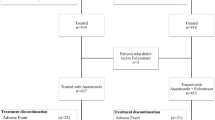Abstract
ATENA (Adjuvant post-Tamoxifen Exemestane versus Nothing Applied): a phase III randomized parallel-group multicenter trial, designed to compare 5 Years of adjuvant exemestane versus 5 years of observation in postmenopausal women with operable breast cancer who have received 5–7 years of adjuvant tamoxifen. The primary endpoint is disease-free survival. The effects of extended adjuvant therapy with exemestane on the lipid profile was a secondary endpoint. This trial was prematurely discontinued in November 2005 due to poor accrual following publication of the results of the MA.17 trial, which demonstrated a reduced risk of recurrence with extended adjuvant therapy using letrozole.





Similar content being viewed by others
Notes
This summary has been extracted from Clinical Trials Insight, a proprietary database owned by Adis. Clinical Trials Insight is a database of global drug trial information that aides in the identification and assessment of published results and ongoing clinical studies.
References
Markopoulos C, et al. Extended adjuvant hormonal therapy with exemestane has no detrimental effect on the lipid profile of postmenopausal breast cancer patients: final results of the ATENA lipid substudy. Breast Cancer Research 2009; 11 (3): R35
Goss PE, et al. A randomized trial of letrozole in postmenopausal women after five years of tamoxifen therapy for early-stage breast cancer. N Engl J Med 2003; 349 (19): 1793–802
Clinical Trials.gov. Breast cancer: exemestane [online]. Available from URL: http://clinicaltrials.gov/ct2/show/NCT00810706 [Accessed 2012 Jan 13]
Novartis International AG. Femara gains approval in Switzerland as only post-tamoxifen treatment for early breast cancer [media release]. 2004 Aug 12 [online]. Available from URL: http://www.novartis.com [Accessed 2012 Jan 13]
Novartis Oncology. Femara® (letrozole tablets) gains U.S. FDA approval as only post-tamoxifen treatment for early breast cancer [media release]. 2004 Oct 29 [online]. Available from URL: http://www.novartis.com [Accessed 2012 Jan 13]
Novartis. Femara® approved in Germany as the only hormonal therapy given after standard tamoxifen for post-menopausal womenwith early breast cancer [media release]. 2005 Mar 7 [online]. Available from URL: http://www.novartis.com [Accessed 2012 Jan 13]
Novartis Pharmaceuticals Canada Inc. Health Canada approves first and only breast cancer treatment that improves disease-free survival beyond five years of diagnosis [media release]. 2005 Apr 11 [online]. Available from URL: http://www.novartis.ca [Accessed 2012 Jan 13]
di Salle E, et al. Exemestane (FCE 24304), a new steroidal aromatase inhibitor. J Steroid Biochem Mol Biol 1992; 43 (1–3): 137–43
Haynes BP, et al. The pharmacology of letrozole. J Steroid Biochem Mol Biol 2003; 87 (1): 35–45
Goss PE. Risks versus benefi ts in the clinical application of aromatase inhibitors. Endocr Relat Cancer 1999; 6 (2): 325–32
Author information
Authors and Affiliations
Rights and permissions
About this article
Cite this article
Sweetlove, M. Phase III ATENA Trial of Exemestane Discontinued. Pharm Med 26, 45–47 (2012). https://doi.org/10.1007/BF03256891
Published:
Issue Date:
DOI: https://doi.org/10.1007/BF03256891




